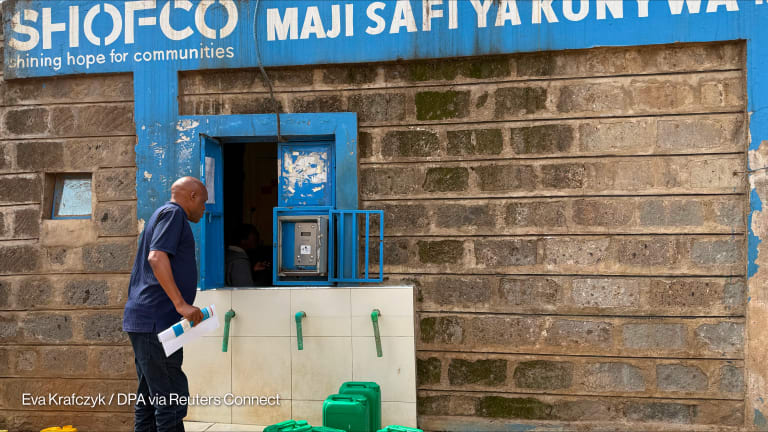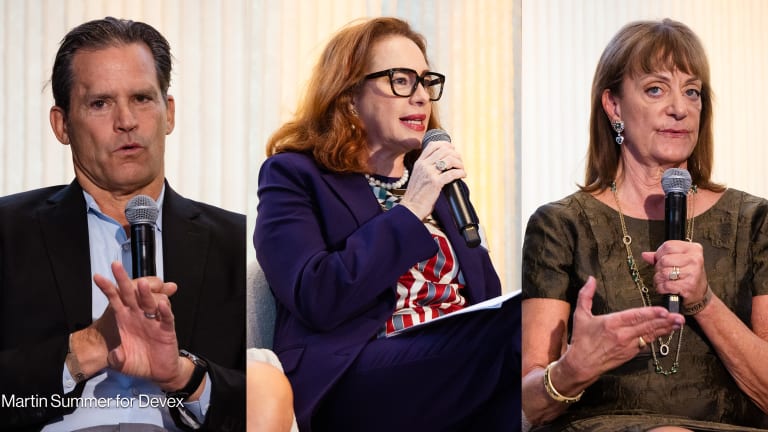Q&A: How to win USAID grants in South Sudan
The government of the United States is the largest donor to South Sudan, giving more than $2 billion since 2013. In this exclusive interview, Devex sat down with two leaders of the U.S. Agency for International Development's Vistas program, which awards small grants to NGOs across the country, to find out what it takes to win USAID funding.
As South Sudan’s civil war heads into its fourth year, donors continue doing what they can to stem the crisis. Currently 100,000 people face starvation and 7.5 million South Sudanese are reliant on humanitarian aid — more than half the country’s population. The United States government is the largest donor to South Sudan, giving more than $2 billion since 2013. U.S. Agency for International Development funds are distributed across both development and humanitarian initiatives, and in programs ranging from health to education to economic growth, as well as funding partners through the Office of Foreign Disaster Assistance. USAID’s “Viable Support to Transition and Stability” program, implemented by AECOM, awards small grants to NGOs across the country. With offices in six of the historical 10 states, the Vistas program has been operating in South Sudan for almost 10 years. “Stick with what you’re good at. Stick with something narrow that looks achievable with a clear focus and possible outcome.” --— Aaron Shapiro, Vistas grants coordinator at USAID In this exclusive interview, Devex sat down with Vistas Grants Coordinator Aaron Shapiro and Director of Research, Reporting and Evaluation Ali Raza, who explain what it takes to apply and be approved for USAID funding. As we found out, projects must be extremely focused and narrow in scope. “Stick with what you’re good at,” Shapiro said. “Stick with something narrow that looks achievable with a clear focus and possible outcome.” The Vistas program works mainly with small grant mechanisms of around US$150,000 and on short-term projects that should be turned around within three to six months. As Vistas is not a development program, the idea is not to provide a sustainable, long-term fix to problems, but to aid NGO initiatives in the moment, Shapiro explained. As part of the office of transition and conflict management, Vistas places a strong emphasis on addressing conflict mitigation and peacebuilding. Most of their grants are given in-kind, in that they procure materials on the organization’s behalf. For example, they might procure plastic chairs, or pay for the venue and transport for the participants of peace meetings and dialogues. Here’s more from Devex’s interview with Shapiro and Raza, edited for length and clarity. What types of organizations do you work with? We give a lot of support for local level dialogues, as our mandate is: Focusing on local conflict with national implications rather than addressing national conflict that trickles down. Our work is a lot more effective than other organizations in South Sudan in that we don’t have to work with a registered NGO. We’re one of the few people who do this so that if you’re a local group that’s doing a lot of good stuff, we’re allowed to work with you. We like to work with people who are already active, and not just waiting for support. The higher level of initiative means you can trust that someone cares about what they’re doing, and that they’re trying to get something done on their own. We fund lots of organizations that could potentially be local peace committees. In some cases these programs have helped set up teams where they pull members from different tribes or clans that are part of a localized conflict and hold peace talks. What are the objectives that potential projects need to align with? 1. Bringing people together in public spaces in ways that can cut across community divides: This includes fun activities and is quite specific to Juba. For example, last year we sponsored the national wrestling tournament. We think we can work towards trying to change the mood in the national capital, and make being together across communities a bit more normal. These include initiatives like cultural dance, support for concerts, the girl guides etc. “Hopefully people can have a more nuanced view of things and be less willing to jump into conflict with better information.” --— Aaron Shapiro,Vistas program grants coordinator and Ali Raza, director of research, reporting and evaluation at USAID 2. Support to media: Anything that can help keep good sources of information getting out to people. We support programs through the radio, including two or three local stations with FM coverage for those areas. In some cases, we’ve supported them to make soap operas and local dramas in local languages with peace themes. We support other media activities, all with the goal of people having better information available to them, which is one way to prevent mobilization towards violence. When people’s only source of information is extremely local, and at times a warlord is scaring people with his narrative, hopefully people can have a more nuanced view of things and be less willing to jump into conflict with better information. 3. Psychosocial needs in the Protection of Civilian site in Juba and trauma awareness: Trauma awareness is about understanding cycles of violence, and how to step out of the victim perpetrator cycles that people can get into. We do five-day sessions with about 25 participants and it’s very complimentary to all of our peacebuilding programs. We also try to provide healthy outlets within the Juba PoC site, such as lectures for university level students, computer training, english grammar and literature classes and South Sudanese culture courses. What projects don’t you take on? Long-term economic growth is not something we’re capable of addressing seriously. Quite often people will come without any solid idea, and say they work on health or water or education and peacebuilding. We’ll send them away and say, “if you have a specific concept that’s more in the peacebuilding realm, then come back to us.” We’ll sometimes get a concept note that is three pages of background on the conflict in South Sudan and then a half page on the actual project. We don’t need that. We want to know what you want to do, and what you think it will achieve. If someone wants to do work where they’re not actually based, we won’t do that either. We, as a program, have always placed a lot of value on understanding our context. So it’s important to know on the local or national level who the players are, and what the conflicts are. What can people do to improve their chances of securing a grant? “We want a proven track record so that when we fund something, we know [people] will be able to deliver their part of it … It’s [also] important to have a clear focus.” --— Aaron Shapiro,Vistas program grants coordinator and Ali Raza, director of research, reporting and evaluation at USAID Be in line with our objectives. We eliminate people who talk about things that we don’t do. It’s a red flag for us if you’re an NGO and haven’t implemented a program before. Unfortunately we need people who can implement, not people who are going to develop. So we want a proven track record so that when we fund something, we know they’ll be able to deliver their part of it. It’s important to have a clear focus, as it’s also a red flag if someone works in water, health, education, peacebuilding, gender etc. To us it looks like they’re trying to get whatever money they can and that they’re not passionate about something and don't have a specific reason they exist beyond trying to pick up grants here and there. Another big thing is scope. It has to be narrow enough in scope that they can complete what they’re proposing and we can understand their capacity before giving them a bigger grant. If someone comes with a huge peacebuilding agenda that has them making radio spots, holding peace meetings in communities and making films, we don’t really want that. How do local NGOs hear about what’s available if they want to apply for funding? There aren’t so many options in South Sudan for local organizations looking for partners. We don’t generally advertise, unless we’re coming up with an idea and know there’s a good partner out there, in which case we might approach them. We’re not that hard to find for people looking for grants. In the field — anywhere outside of Juba — we have a pretty large footprint, having been around for a number of years. You might submit something to the U.S embassy and they might push it in our direction. People can get connected to us that way, otherwise, it’s a lot of word of mouth. What’s the difference between field and Juba projects? Raza: One big distinction between the field and Juba is that there aren’t a lot of options in field sites in terms of choice for partners. You don’t get a lot of official applications, so in the field, at times, you have to look for people. Sometimes we might have something we’re interested in doing and we might try and identify if there’s a local partner who’s best suited to that purpose. Quite often there’s only a couple of viable ones. In Juba there are many organizations and so there are a lot more options. Take us through the application process? We have a very simple mechanism and there’s not a lot of formality to it. We’ll take a concept note — abbreviated proposal — that can be anything. For example, someone can give us two pages and we’ll judge it based on merit. We don’t have a formal template that requires 20 pages. In general we want to know: What the idea is, what the different elements of it are and what it would accomplish. We want background information on the organization to see if they have any relevant skills to do this. Once someone submits the proposal, we'll have a conversation and say one of two or three things. One thing we might say is, “sorry we’re not interested, this has nothing to do with our objectives.” If someone comes in with a good idea and we like it, we’d have some back and forth and then send the initial idea to USAID. They usually approve what we put forward because they are things within our strategy. They’ll then come back to us, and we’ll develop a bit more of the details with the grantee, before sending back to USAID for full approval. What percentage of applications received do you accept? We reject far more than we can accept. For the Juba team, we probably deal with about 20 requests/applications a month, of which we’re never going to take on more than three or four at a time. “Be as plugged into the whole international development world as possible. Make sure you know what the U.N. is doing, and all the different actors in your region.” --— Ali Raza, Vistas program’s director of research, reporting and evaluation at USAID What advice would you give to people looking for funding in the field? Raza: Be as plugged into the whole international development world as possible. Make sure you know what the U.N. is doing, and all the different actors in your region including the various INGOs. If someone is seeking us out, they have to be plugged in with the local government and with donor agencies as much as possible. As well, know what we’re willing to fund and what we’re doing. How can people be plugged in? Raza: It’s very hard to do from a national level, it’s easier at the regional level. For example, in particular cities, ask around about peace dialogues and you’ll pretty soon find out that we do that kind of stuff. Do you ever give money directly to local or international NGOs? Generally speaking we wouldn't give to someone such as Oxfam. If an organization can show us what they’re doing and if, say, they had a $100,000 shortfall to charter flights for example, we could potentially do that. What types of international organizations do you work with? In general, it’s people who are already active, doing things that line up with our objectives and who are working at a community level. There aren’t so many INGOs that we fund, as we look for smaller projects that are limited in scope. We’re not good for an INGO that thinks they’ll start a whole new project in South Sudan. On the other hand, if we can help co-fund something, that’s a model that can work well for everyone. For example, with the Whitaker Peace & Development Initiative we actually asked them for a meeting. We were able to glean that they were doing some work but weren’t able to do everything they wanted to. So we worked out an in-kind grant and gave them sports kit, shirts and shoes and volleyballs and footballs. We specifically support them to do peace engagement days every few weeks, where they run sports competitions and also address themes such as conflict resolution and peace messaging. How do you think the U.S. government’s new international aid policies will affect the funding of future projects? People don’t have any sense of which direction it might go. South Sudan is still considered by many to be a priority country. I don’t think we’re particularly worried that the rug’s going to be pulled out from under us at one or two months’ notice. But the future isn’t clear. Read more international development news online, and subscribe to The Development Newswire to receive the latest from the world’s leading donors and decision-makers — emailed to you free every business day.
As South Sudan’s civil war heads into its fourth year, donors continue doing what they can to stem the crisis. Currently 100,000 people face starvation and 7.5 million South Sudanese are reliant on humanitarian aid — more than half the country’s population.
The United States government is the largest donor to South Sudan, giving more than $2 billion since 2013. U.S. Agency for International Development funds are distributed across both development and humanitarian initiatives, and in programs ranging from health to education to economic growth, as well as funding partners through the Office of Foreign Disaster Assistance.
USAID’s “Viable Support to Transition and Stability” program, implemented by AECOM, awards small grants to NGOs across the country. With offices in six of the historical 10 states, the Vistas program has been operating in South Sudan for almost 10 years.
This story is forDevex Promembers
Unlock this story now with a 15-day free trial of Devex Pro.
With a Devex Pro subscription you'll get access to deeper analysis and exclusive insights from our reporters and analysts.
Start my free trialRequest a group subscription Printing articles to share with others is a breach of our terms and conditions and copyright policy. Please use the sharing options on the left side of the article. Devex Pro members may share up to 10 articles per month using the Pro share tool ( ).
Sam Mednick is a Devex Contributing Reporter based in Burkina Faso. Over the past 15 years she has reported on conflict, post-conflict, and development stories from the Middle East, Africa, Asia, South America, and Europe. She recently spent almost three years reporting on the conflict in South Sudan as the Associated Press correspondent. Her work has also appeared in The New Humanitarian, VICE, The Guardian, Foreign Policy, and Al Jazeera, among others.








